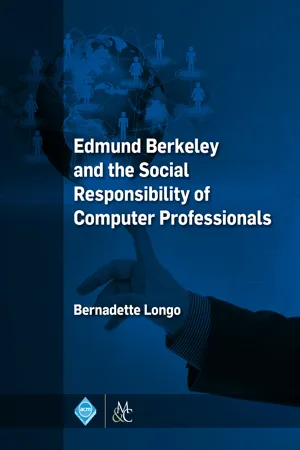
eBook - ePub
Edmund Berkeley and the Social Responsibility of Computer Professionals
- 222 pages
- English
- ePUB (mobile friendly)
- Available on iOS & Android
eBook - ePub
Edmund Berkeley and the Social Responsibility of Computer Professionals
About this book
Edmund C. Berkeley (1909 – 1988) was a mathematician, insurance actuary, inventor, publisher, and a founder of the Association for Computing Machinery (ACM). His book Giant Brains or Machines That Think (1949) was the first explanation of computers for a general readership. His journal Computers and Automation (1951-1973) was the first journal for computer professionals. In the 1950s, Berkeley developed mail-order kits for small, personal computers such as Simple Simon and the Braniac. In an era when computer development was on a scale barely affordable by universities or government agencies, Berkeley took a different approach and sold simple computer kits to average Americans. He believed that digital computers, using mechanized reasoning based on symbolic logic, could help people make more rational decisions. The result of this improved reasoning would be better social conditions and fewer large-scale wars. Although Berkeley's populist notions of computer development in the public interest did not prevail, the events of his life exemplify the human side of ongoing debates concerning the social responsibility of computer professionals.
This biography of Edmund Berkeley, based on primary sources gathered over 15 years of archival research, provides a lens to understand social and political decisions surrounding early computer development, and the consequences of these decisions in our 21st century lives.
Frequently asked questions
Yes, you can cancel anytime from the Subscription tab in your account settings on the Perlego website. Your subscription will stay active until the end of your current billing period. Learn how to cancel your subscription.
No, books cannot be downloaded as external files, such as PDFs, for use outside of Perlego. However, you can download books within the Perlego app for offline reading on mobile or tablet. Learn more here.
Perlego offers two plans: Essential and Complete
- Essential is ideal for learners and professionals who enjoy exploring a wide range of subjects. Access the Essential Library with 800,000+ trusted titles and best-sellers across business, personal growth, and the humanities. Includes unlimited reading time and Standard Read Aloud voice.
- Complete: Perfect for advanced learners and researchers needing full, unrestricted access. Unlock 1.4M+ books across hundreds of subjects, including academic and specialized titles. The Complete Plan also includes advanced features like Premium Read Aloud and Research Assistant.
We are an online textbook subscription service, where you can get access to an entire online library for less than the price of a single book per month. With over 1 million books across 1000+ topics, we’ve got you covered! Learn more here.
Look out for the read-aloud symbol on your next book to see if you can listen to it. The read-aloud tool reads text aloud for you, highlighting the text as it is being read. You can pause it, speed it up and slow it down. Learn more here.
Yes! You can use the Perlego app on both iOS or Android devices to read anytime, anywhere — even offline. Perfect for commutes or when you’re on the go.
Please note we cannot support devices running on iOS 13 and Android 7 or earlier. Learn more about using the app.
Please note we cannot support devices running on iOS 13 and Android 7 or earlier. Learn more about using the app.
Yes, you can access Edmund Berkeley and the Social Responsibility of Computer Professionals by Bernadette Longo in PDF and/or ePUB format, as well as other popular books in Technology & Engineering & Computer Science General. We have over one million books available in our catalogue for you to explore.
Information
Table of contents
- Cover
- Half title
- Title
- Copyright
- Contents
- Preface
- Introduction: A Struggle of Ideas
- Chapter 1 Modern Methods of Thinking, 1927–1941
- Chapter 2 Navy Assignment at the Harvard Computation Lab, 1944–1946
- Chapter 3 Establishing Open Communication Channels for Technology Development, 1945–1948
- Chapter 4 Robots and Giant Brains, 1942–1961
- Chapter 5 National Security Investigations, 1948–1955
- Chapter 6 Engineering Peace, 1948–1970
- Chapter 7 A Denunciation of Killing Devices, 1952–1972
- Chapter 8 The Remaking of Man, 1973–1987
- Bibliography
- Author’s Biography